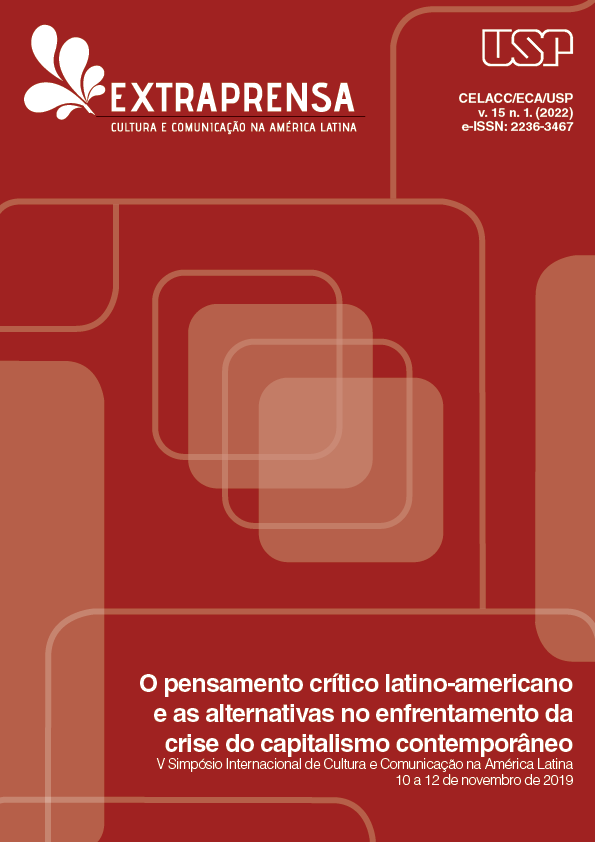Expressions of the struggle of cultural collectives on the outskirts of São Paulo in times of pandemic
DOI:
https://doi.org/10.11606/extraprensa2022.194424Keywords:
Coloniality of power, Necropolitics, Territorialization, QuilombagemAbstract
The main banner of the Brazilian black movement today, the genocide of black youth, has gained evidence through new forms of protests, amplified by various demands arising in the peripheral territories in democratic regimes. Using the concept of coloniality of power by Quijano (2005) and necropolitics by Mbembe (2012), we bring the reality of cultural collectives from the outskirts of the city of São Paulo to propose new meanings to the public sphere in the face of various complaints. It is necessary to discuss the Brazilian social formation since its slave production mode to understand the radical black protest that Moura (2001) will call quilombagem. This reflection is based on the experience of these groups during the pandemic of the coronavirus, through a virtual debate promoted by the Observatory of Cultural Collectives of the Peripheries of São Paulo, which brings into the arena of work and cultural public policies aspects of this exclusion in the social contract.
Downloads
References
ALMEIDA, S. L. Racismo estrutural. São Paulo: Sueli Carneiro; Editora Jandaíra, 2021.
D’ANDREA, Tiaraju Pablo. A formação dos sujeitos periféricos: cultura e política na periferia de São Paulo. Tese (Doutorado em Sociologia) Faculdade de Filosofia, Letras e Ciências Humanas, Universidade de São Paulo. São Paulo, 2013. Disponível em: <https://www.teses.usp.br/teses/disponiveis/8/8132/tde-18062013-095304/publico/2013_TiarajuPabloDAndrea_VCorr.pdf> Acesso em: 21 jul. 2021.
D’ANDREA, Tiaraju Pablo. Contribuições para definição dos conceitos periferia e sujeitas e sujeitos periféricos. Dossiê Subjetividades Periféricas. Novos Estudos. CEBRAP. São Paulo. Vol. 39, 19-36, jan-abr. 2020.
FANON, Frantz. Os condenados da terra. Editora Civilização Brasileira. 1968.
FAUSTINO, Deivison Mendes. Frantz Fanon: um revolucionário, particularmente negro. 1 ed. São Paulo: Ciclo Contínuo Editorial, 2018.
GARCIA CANCLINI, Nestor. Culturas transnacionales y culturas populares. Lima: IPAl, 1987.
GONZALEZ, Lélia. A juventude negra brasileira e a questão do desemprego. In: Annual Meeting of the African Heritage Studies Association. Pittsburgh, 26-29 abr. 1979.
Mimeografado.
HALL, Stuart. A identidade cultural na pós-modernidade. S. Paulo: L&PM, 2011.
MOURA, C. Dialética radical do Brasil negro. São Paulo: Anita, 1994.
MOURA, C. A quilombagem como expressão de protesto radical. 2001 Disponível em: <https://www.marxists.org/portugues/moura/2001/mes/quilombagem.htm> Acesso em: 11 de jul 2021.
MOURA, C. O negro: de bom escravo a mau cidadão. 2 ed. São Paulo: Editora Dandara, 2021.
MBEMBE, Achille. Necropolítica. Arte & Ensaio. Revista do ppgav/eba/UFRJ, n.32. Dezembro, 2016. Disponível em: < https://revistas.ufrj.br/index.php/ae/article/view/8993> Acesso em: 21jul.2021.
MBEMBE, Achille. Crítica da razão negra. Antígona Editores. 2014.
MILLS, Charles W. (2013). O contrato de dominação. In: Meritum – Belo Horizonte – v. 8 – n. 2 – p. 15-70 – jul./dez. 2013. Disponível em: file:///C:/Users/User/Downloads/2162-Texto%20do%20Artigo-4488-1-10-20140408.pdf> Acesso em 30 jul.2021.
OLIVEIRA, Dennis. Racismo estrutural - Apontamentos para uma discussão conceitual. 2001. In Minga/Mutirão Informativa de Movimientos Sociales. Disponível em: <https://movimientos.org/node/371?key=371>. Acesso em 31 jul. 2021.
OLIVEIRA, Dennis. Racismo estrutural: uma perspectiva histórico-crítica. São Paulo: Editora Dandara, 2021a.
OLIVEIRA, Dennis. Periferias insurgentes: ações culturais de jovens na periferia de São Paulo. São Paulo: Instituto de Estudos Avançados, 2021b.
OLIVEIRA, Dennis. Movimentos sociais, cultura, comunicação e território na América Latina: estudos de experiências de São Paulo, Bogotá e Buenos Aires. In: Relatório final FAPESP. 2018.
OLIVEIRA, Dennis. Ação direta do capital: o poder do capitalismo contemporâneo. Rev. psicol. polít. Vol.15 no.33 São Paulo ago. 2015. Disponível em: < http://pepsic.bvsalud.org/scielo.php?script=sci_arttext&pid=S1519-549X2015000200011> Acesso em 22 jul. 2021.
MIGNOLO, Walter D. La colonialidad a largo y a lo ancho: el hemisfério occidental en el horizonte colonial de la modernidad. In:LANDER, Edgardo. La colonialidad del saber: eurocentrismo y ciências sociales. Perspectivas latinoamericanas. Buenos Aires. CLACSO, Consejo Latinoamericano de Ciencias Sociales, 2000.
QUIJANO, Anibal. Colonialidade do poder, eurocentrismo e América Latina. In: A colonialidade do saber: eurocentrismo e ciências sociais: perspectivas latinoamericanas.
LANDER, Edgardo (Org.). Buenos Aires: CLACSO, 2005. p. 117-142.
ZIBECHI, Raúl. Los movimientos sociales latinoamericanos: tendencias y desafíos. En: OSAL: Observatorio Social de América Latina. No. 9 (ene. 2003- ). Buenos Aires: CLACSO, 2003.
Downloads
Published
Issue
Section
License
Copyright (c) 2022 Tâmara Pacheco

This work is licensed under a Creative Commons Attribution-NonCommercial-NoDerivatives 4.0 International License.
Ao submeter qualquer material científico para Extraprensa, o autor, doravante criador, aceita licenciar seu trabalho dentro das atribuições do Creative Commons, na qual seu trabalho pode ser acessado e citado por outro autor em um eventual trabalho, porém obriga a manutenção de todos os autores que compõem a obra integral, inclusive aqueles que serviram de base para o primeiro.
Toda obra aqui publicada encontra-se titulada sob as seguintes categorias da Licença Creative Commons (by/nc/nd):
- Atribuição (de todos os autores que compõem a obra);
- Uso não comercial em quaisquer hipóteses;
- Proibição de obras derivadas (o trabalho não poderá ser reescrito por terceiros. Apenas textos originais são considerados);
- Distribuição, exibição e cópia ilimitada por qualquer meio, desde que nenhum custo financeiro seja repassado.
Em nenhuma ocasião a licença de Extraprensa poderá ser revertida para outro padrão, exceto uma nova atualização do sistema Creative Commons (a partir da versão 3.0). Em caso de não concordar com esta política de Direito Autoral, o autor não poderá publicar neste espaço o seu trabalho, sob pena de o mesmo ser removido do conteúdo de Extraprensa.







